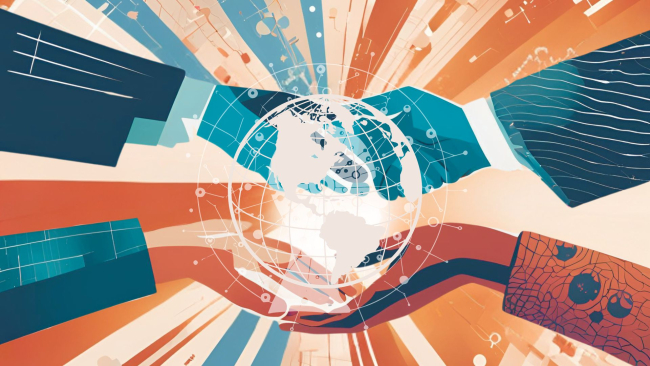Technological innovation
Technological ecosystems are being restructured in the wake of innovations such as artificial intelligence and quantum technology, prompting investment policies and efforts at governance and regulation.
Related Subjects

AI, Data Centers and Energy Demand: Reassessing and Exploring the Trends
The information and communication technologies sector today accounts for 9% of global electricity consumption, data centers for 1-1.3%, and artificial intelligence (AI) for less than 0.2%. The growing energy demands of cloud services first, and now AI workloads (10% of today’s data centers electricity demand), have exacerbated this trend. In the future, hyperscale data centers will gain shares amongst all kinds of data centers and AI will probably account for around 20% of data centers electricity demand by 2030.

AI showcase pays off for France, but US tech scepticism endures
France is staking its claim as an AI powerhouse. At the AI Action Summit in Paris this week, global leaders, tech innovators, and policymakers converged to chart the future of artificial intelligence - backed by major investments and bold ambitions for Europe’s leadership in the field. RFI breaks down the key takeaways.
Artificial Promises or Real Regulation? Inventing Global AI Governance
The risks inherent to the unregulated use of AI, a key technology and vector of profound transformations within societies underline the pressing need to harmonize governance efforts at the international level. The Summit for Action on Artificial Intelligence to be held in Paris in mid-February could be an unprecedented timely occasion to agree on a global governance framework of AI for the public good.
China’s Mature Node Overcapacity: Unfounded Fears
China is decoupling from, not flooding, the global mature-node semiconductor market. As China increasingly pursues industrial policies encouraging domestic chip production, its own growing chip demand will prevent a direct flood of cheap Chinese chips on foreign shores. However, as Beijing achieves its goal of decreasing the reliance of domestic downstream manufacturers on foreign chips, European and American mature-node semiconductor companies will feel the ripple effects of an increasingly “involuted” Chinese chip ecosystem.
Sat-to-Cell: Towards Universal Connectivity?
Sat-to-Cell is a new type of service that connects smartphones directly to satellites. It has recently enabled innovative applications such as emergency text messaging via satellite. The technology is developing rapidly, and many questions are now being raised about its potential impact.
Funding A Rival: When the United States and Europe Invest in Chinese Tech
Outbound investments into rival powers are receiving increasing political attention on both sides of the Atlantic, as competition between the United States and China intensifies. The concern lies with American and European investments in certain Chinese technologies - such as artificial intelligence, biotechnology, semiconductors, or quantum computing - which could enable China to enhance its military capabilities and thus may pose risks to national and international security.


China seeks its own Apollo moment – and more
On April 25, a Long March 2F rocket briefly lit up the dark desert sky above Jiuquan Spaceport in northwest China, carrying three Shenzhou-18 astronauts to the Tiangong space station. Such missions, including crew handovers, have become remarkably routine for China.
Groundbreaking Chip Sovereignty: Europe’s Strategic Push in the Semiconductor Race
The EU Chips Act’s enactment in September 2023 marks a major policy shift that revitalizes industrial policy in Europe. By allowing state subsidies for semiconductor projects, it has the potential to secure Europe’s supply chain security and technological autonomy in an industry dominated by the US and East Asia.
Why Chinese Fintechs Have Failed to Reshuffle International Finance
New Chinese financial technologies, including unparalleled electronic payment systems, have so far failed to threaten U.S. financial dominance.
2024: A Pivotal Year for the Space Sector?
2024 could be a pivotal year for space exploration. New launchers are set to make their first flight, satellite constellations and other trends promise to redefine the way space is explored and exploited.
AI, Data Centers and Energy Demand: Reassessing and Exploring the Trends
The information and communication technologies sector today accounts for 9% of global electricity consumption, data centers for 1-1.3%, and artificial intelligence (AI) for less than 0.2%. The growing energy demands of cloud services first, and now AI workloads (10% of today’s data centers electricity demand), have exacerbated this trend. In the future, hyperscale data centers will gain shares amongst all kinds of data centers and AI will probably account for around 20% of data centers electricity demand by 2030.
Artificial Promises or Real Regulation? Inventing Global AI Governance
The risks inherent to the unregulated use of AI, a key technology and vector of profound transformations within societies underline the pressing need to harmonize governance efforts at the international level. The Summit for Action on Artificial Intelligence to be held in Paris in mid-February could be an unprecedented timely occasion to agree on a global governance framework of AI for the public good.
Sat-to-Cell: Towards Universal Connectivity?
Sat-to-Cell is a new type of service that connects smartphones directly to satellites. It has recently enabled innovative applications such as emergency text messaging via satellite. The technology is developing rapidly, and many questions are now being raised about its potential impact.
Funding A Rival: When the United States and Europe Invest in Chinese Tech
Outbound investments into rival powers are receiving increasing political attention on both sides of the Atlantic, as competition between the United States and China intensifies. The concern lies with American and European investments in certain Chinese technologies - such as artificial intelligence, biotechnology, semiconductors, or quantum computing - which could enable China to enhance its military capabilities and thus may pose risks to national and international security.
Groundbreaking Chip Sovereignty: Europe’s Strategic Push in the Semiconductor Race
The EU Chips Act’s enactment in September 2023 marks a major policy shift that revitalizes industrial policy in Europe. By allowing state subsidies for semiconductor projects, it has the potential to secure Europe’s supply chain security and technological autonomy in an industry dominated by the US and East Asia.
Why Chinese Fintechs Have Failed to Reshuffle International Finance
New Chinese financial technologies, including unparalleled electronic payment systems, have so far failed to threaten U.S. financial dominance.
TB2 Bayraktar: Big Strategy for a Little Drone
Since 2016, the tactical drone TB2 Bayraktar—“standard bearer” in Turkish—has received considerable media attention, particularly during the conflict in Nagorno-Karabakh in 2020. Thanks to Azerbaijan’s victory over its neighbor Armenia, the drone, manufactured by Baykar, is now a proven combat system with increasing numbers of export clients.
Reshuffling Value Chains - South Korea as a Case Study
Despite all the talks about the reshuffling of value-chains and the trend to a form of industrial “Desinicization” (or decoupling/disengagement from China), the example of South Korea does not vindicate such assertions.
The Technology Policies of Digital Middle Powers
Digital technology is an element of power in the international system as well as an area for competition among countries. The study provides a qualitative comparison of the technology policies of nine of the digital middle powers: Brazil, India, Israel, Japan, Kenya, Nigeria, Russia, South Korea, and the United Kingdom. It seeks to reflect the diversity of national technology policies, as well as to identify those countries’ convergences and divergences with Europe, the United States and China.
South Korea and IPEF: Rationale, Objectives and the Implications for Partners and Neighbors
As a key manufacturer of high-end technology components critical to the sustainability of the Fourth Industrial Revolution, South Korea is essential in any effort to rebuild a resilient global supply chain but also to the promotion of a clean economy. South Korea can thus contribute to two of the pillars of IPEF (Indo-Pacific Economic Framework), specially to pillars II and III (supply-chain resilience and a clean economy).

AI showcase pays off for France, but US tech scepticism endures
France is staking its claim as an AI powerhouse. At the AI Action Summit in Paris this week, global leaders, tech innovators, and policymakers converged to chart the future of artificial intelligence - backed by major investments and bold ambitions for Europe’s leadership in the field. RFI breaks down the key takeaways.


China seeks its own Apollo moment – and more
On April 25, a Long March 2F rocket briefly lit up the dark desert sky above Jiuquan Spaceport in northwest China, carrying three Shenzhou-18 astronauts to the Tiangong space station. Such missions, including crew handovers, have become remarkably routine for China.


Semiconductors: how the United States is suffocating China
The United States are ramping up its efforts to deny China access to the most advanced semiconductors powering smartphones, personal computers and the latest generation of supercomputers.

AI showcase pays off for France, but US tech scepticism endures
France is staking its claim as an AI powerhouse. At the AI Action Summit in Paris this week, global leaders, tech innovators, and policymakers converged to chart the future of artificial intelligence - backed by major investments and bold ambitions for Europe’s leadership in the field. RFI breaks down the key takeaways.
Support independent French research
Ifri, a foundation recognized as being of public utility, relies largely on private donors – companies and individuals – to guarantee its sustainability and intellectual independence. Through their funding, donors help maintain the Institute's position among the world's leading think tanks. By benefiting from an internationally recognized network and expertise, donors refine their understanding of geopolitical risk and its consequences on global politics and the economy. In 2024, Ifri will support more than 70 French and foreign companies and organizations.

















